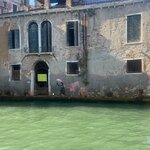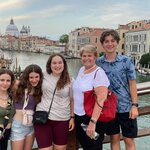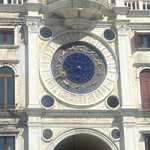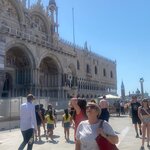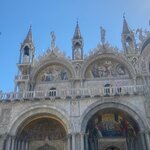Highlights
- Visit glassmaking workshops on the colorful island of Murano
- Explore the cliffside fishing towns of Positano and Anacapri
- View world-famous art on a self-guided tour of the Galleria Borghese
- Enjoy a full day of wine tasting in medieval towns in Tuscany
- Go back in time with a tour of the Colosseum and Roman Forum
Brief Itinerary
| Day | Highlights | Overnight |
|---|---|---|
| Day 1 | Arrive in Rome, Train to Venice, Evening Walking Food Tour | Venice |
| Day 2 | Venice Walking Tour | Venice |
| Day 3 | Murano, Burano & Torcello Excursion | Venice |
| Day 4 | Free Day in Venice | Venice |
| Day 5 | Train to Florence, Afternoon Food Tour | Florence |
| Day 6 | Day Trip to San Gimignano & Siena, Wine Tasting in the Chianti Classico | Florence |
| Day 7 | Free Day in Florence | Florence |
| Day 8 | Transfer to the Amalfi Coast, Positano Sunset Cruise | Amalfi |
| Day 9 | Day Trip to Capri & Anacapri | Amalfi |
| Day 10 | Free Day on the Amalfi Coast | Amalfi |
| Day 11 | Return to Rome, Afternoon Colosseum & Forum Tour | Rome |
| Day 12 | Vatican Tour: Sistine Chapel & St. Peter's Basilica, Rome Walking Tour | Rome |
| Day 13 | Galleria Borghese, Free Afternoon in Rome | Rome |
| Day 14 | Depart Rome |
Detailed Itinerary
Day 1: Arrive in Rome, Train to Venice, Evening Walking Food Tour
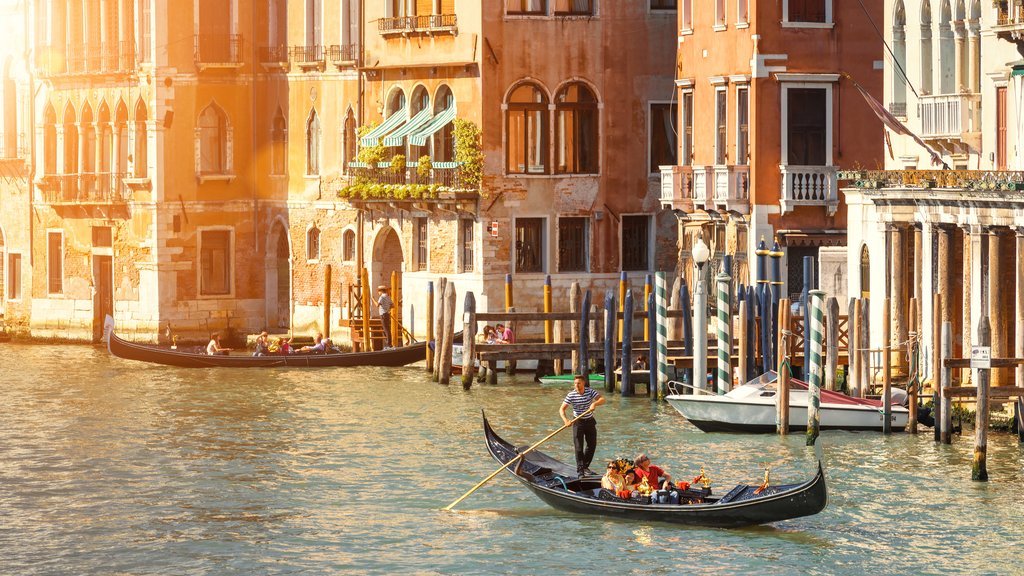
Welcome to Italy! Arrive at one of Rome's two international airports, then transfer to the Roma Termini Station for a ride on the high-speed train en route to Venice. Once in the city, a water taxi will transport you to the town center and your hotel. Venice in northern Italy is famous for both industry and tourism. With nicknames like "Queen of the Adriatic," "City of Water," and "The Floating City," it's clear that the city's myriad canals are its main draw. Stretching across 117 small islands in the marshy Venetian Lagoon along the Adriatic Sea, the city has long been a commercial and cultural hub thanks to its strategic placement.
Depending on when you arrive, a great introduction to the city is to take a romantic cruise down Venice's canals on a historic gondola to see Roman, Baroque, and Gothic architecture and narrow waterways. This is not a guided tour but rather a relaxing cruise that allows you to take in the amazing city from the water.
In the evening, head to the Cannaregio District, the site of the former Jewish Ghetto, for a walking food tour. The area is filled with restaurants & shops offering kosher Venetian specialties, a Jewish museum, and several tourist-friendly synagogues. Eat and drink your way through regional specialties as you learn about the Jewish and kosher influences and sample Cicchetti, creamy risottos, sweet pastries, and local wines. Buon appetito!
Day 2: Venice Walking Tour

Experience Venice's highlights with a guided walking tour. Start at Piazza San Marco (St. Mark's Square), the heart of the city's cultural and administrative district. Tour Palazzo Ducale (Doge's Palace), a Venetian Gothic palace built as the primary residence for the Doge of Venice in 1340. The palace stands on Piazza San Marco, and its resplendent interior decor and priceless works of art make it a must-see for history and architecture buffs. Adjacent to the palace is San Marco's Basilica, originally the Doge's personal chapel. The building is one of the best surviving examples of Italo-Byzantine architecture and features an impressive collection of Byzantine art, gold mosaics, and marble floors.
The palace is also connected to the next-door prison by the infamous Bridge of Sighs, which has joined the two buildings since the 16th century. The bridge features a small window onto Venice's harbor and earned its grisly name from the prisoners' sighing as they got one last glimpse of the city on their way to execution. While most visitors gather outside the bridge to look in, you'll get the best sense of history from inside the bridge, looking out from the same window as the doomed medieval prisoners.
After the morning's tour, grab lunch at one of the city's many cafés before spending the afternoon exploring.
- Tour the 18th-century Chiesa di Santa Maria Assunta (also known as I Gesuiti) in the Cannaregio district and the Baroque 17th-century Basilica di Santa Maria della Salute, Venice's second most renowned church
- Ride the elevator to the top of the Campanile di San Marco for a bird's-eye view of Venice
- Dive into history at the Correr Civic Museum to see art and artifacts displays from Venice's history as well as the former royals' quarters
- Go shopping at the famous Rialto fish market, located at the heart of Venice. The smell of seafood and the sound of vendors vying for shoppers' attention make this colorful and hectic market a must-see for any Venice traveler
In the evening, rent a bike and go for a relaxed bike ride around the city before finding the best bars and nightlife for a night out.
Day 3: Murano, Burano & Torcello Excursion

Head out for a tour of Venice's three famous neighbors—the islands of Murano, Burano, and Torcello. Begin your boat and walking tour aboard a motorboat en route to Murano, passing the island of San Giorgio Maggiore, the tip of Sant'Elena, and the Lido. Tour Murano, which is famous for its colorful glassmaking. Visit a glass blower to learn about the process and marvel at the intricate pieces, including elaborate chandeliers.
From here, continue to Burano, a picture-perfect island known for its colorful houses and elegant lacework. You'll have time to explore the island before the short boat trip to nearby Torcello to see the ancient cathedral with its fine mosaic inlays, followed by a visit to the Church of Santa Fosca.
After spending a full day enjoying the sights and sounds of the unique islands, return to Venice by boat in time for a relaxed evening in a neighborhood restaurant.
Day 4: Free Day in Venice
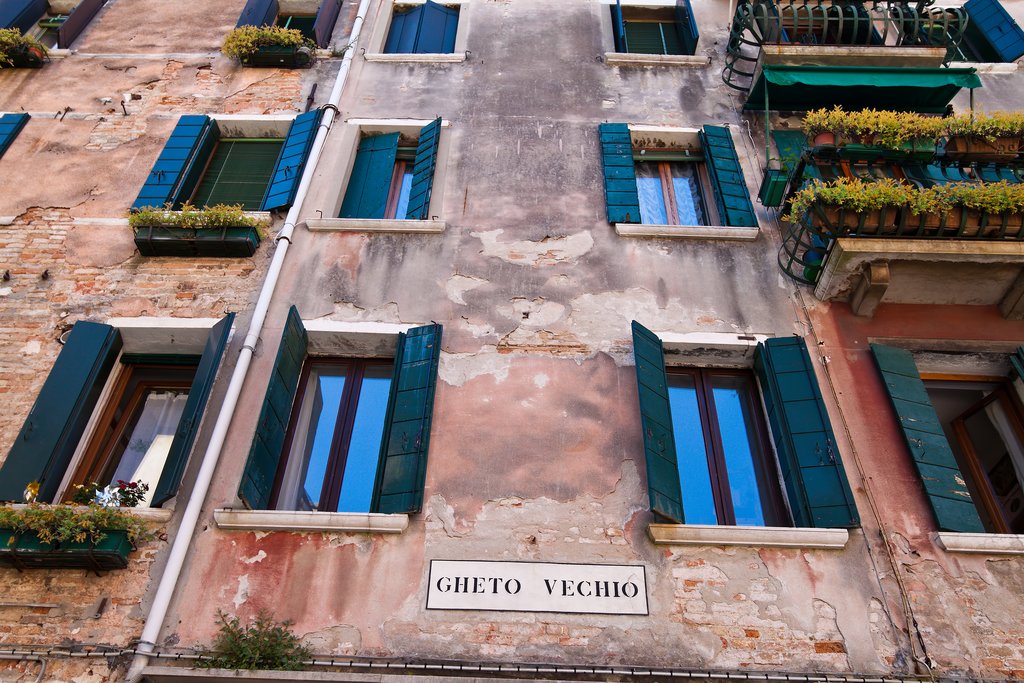
Today is a free day to explore Venice. Make the most of your time in the city with some of the following suggestions:
- Discover art at the Ca' Pesaro Galleria Internazionale d'Arte Moderna, Peggy Guggenheim Collection Modern Art Museum, and La Biennale di Venezia Art Museum
- Explore San Giorgio Maggiore, one of Venice's smaller islands that stands separate from the main canals
- See an opera show at the Teatro La Fenice
- Haggle for produce at the busy Mestre market, held every Wednesday and Friday
- Go shopping for luxury items on Le Mercerie and Salizada San Moisè
- Browse textiles, craft shops, unique boutiques, and galleries in the bohemian San Samuele district
- Rent a kayak and explore Venice from the water
Day 5: Train to Florence, Afternoon Food Tour

After breakfast, head to the train station to catch a train to Florence. Florence is Tuscany's regional capital and its most populous city. Long considered a cultural capital and the "Jewel of the Renaissance," Florence is home to many masterpieces of Renaissance art and architecture, including the iconic Duomo, a terracotta-tiled dome, and the Galleria dell'Accademia, which displays Michelangelo's "David" sculpture.
Spend the day exploring the top sites located in the medieval city center. Popular highlights include the sprawling 15th-century Pitti Palace and the world-famous Uffizi Gallery, which houses work by artists like Michelangelo and Leonardo da Vinci. As a center for art, Florence has hosted many of European history's most notable figures, including Botticelli, Donatello, Dante, Boccaccio, and Niccolò Machiavelli.
In the afternoon, indulge yourself in the decadence of Tuscany's culinary delights. A guided walking tour of the city led by a local is the perfect way to discover the region's history and find the best off-the-beaten-path gelato and coffee shops. Sample wares from city markets to find the best of the best. Try truffle panini, fresh-pressed Tuscan olive oil, and handmade chocolate focaccia, finished with a glass of chilled prosecco or Chianti wine.
Chat with a local specialist who can help organize your trip.
Day 6: Day Trip to San Gimignano & Siena, Wine Tasting in the Chianti Classico

In the morning, head to the Tuscan countryside to explore the Chianti Region. Your first stop is the medieval village of San Gimignano, a UNESCO World Heritage Site located an hour away from Florence, which is famous for its Vernaccia wine and award-winning gelaterias. Explore the beautiful squares, palaces, and churches of the city before grabbing a coffee in an open-air café.
Continue to the Chianti Classico wine region to visit a typical Tuscan winery. The unique characteristics of the local climate have made the region unfavorable to most crops but ideal for growing wine grapes. Alternating fields of olive orchards and vineyards characterize this idyllic landscape. The Chianti wine, made primarily of Sangiovese grapes, is the local staple. Tour the cellars and vineyards, then enjoy a wine tasting accompanied by a delicious Tuscan lunch of pasta, cured meats, cheeses, and local desserts.
In the afternoon, visit nearby Siena, located a scenic hourlong drive away, to see the magnificent Cathedral, Torre del Mangia, and Town Hall, the site of the famous Palio horse race. Finish the day with a visit to the medieval fortress of Monteriggioni before returning to Florence for the night.
Day 7: Free Day in Florence

Today is a free day to explore some of Florence's other notable attractions and highlights. Recommendations for the day include:
- Spend some time learning about Florence's history in the Basilica di Santa Croce history museum
- Explore science and art at the Museo dell'Opera del Duomo (history and art museum) and the Museo Galileo - Institute and Museum of the History of Science
- Visit the Chiesa e Museo di Orsanmichele, which served as the granary for the Sisters of San Michele in previous years,
- Shop for hidden treasures and your lunch special in the San Lorenzo market
- Head to the south bank of the Arno River to the Piazzale Michelangelo viewpoint for panoramic views of the city
- Stroll through the peaceful and relaxing greenery of the Boboli Gardens
Head to La Terrazza Continentale next to the Ponte Vecchio bridge for a predinner cocktail on the terrace while you enjoy the sunset, then make your way to the Sant'Ambrogio neighborhood for dinner accompanied by a glass of Tuscan wine.
Day 8: Transfer to the Amalfi Coast, Positano Sunset Cruise

After breakfast at a sunny open-air café, head to the train station to take the train to Naples, then transfer to your hotel on the Amalfi Coast. This stretch of coastline south of Naples is renowned for its exceptional beauty and iconic medieval cliffside fishing villages. Lemon groves and sprawling summer villas cling to the steep cliffs that lead to sparkling blue water.
In the afternoon, head onto the water with a sunset boat tour to Positano from Amalfi. With its steep houses tumbling down to the sea, old-timey hotels draped in flowering vines, and restaurant terraces, Positano is an obvious favorite with travelers looking for a getaway. Soak in the views of the coast and the Ionian Sea from the boat as you enjoy a glass of Prosecco and some light aperitifs. Swim or snorkel in the clear blue waters, or simply enjoy the view.
Disembark in Positano for a romantic dinner with ocean views. Enjoy a pasta dinner with fresh seafood paired with a glass of fruity Falanghina. Return to Amalfi for the night.
Day 9: Day Trip to Capri & Anacapri

Spend the day enjoying the sunshine, summer villas, and clear blue waters of Capri Island, known locally as the "pearl of the Mediterranean." Capri sits on the south side of the Gulf of Naples and is a popular destination. Ancient Romans used the island for summer villas for the Empire's rich and famous, while the Greeks called Capri the "Isle of Sirens."
In the morning, head out for a scenic drive along the Sorrentine coast to the Sorrento port, where you'll catch a hydrofoil to Capri. From here, go for a guided walking tour of the island's main attractions. See the main harbors (Marina Grande and Marina Piccola), walk along the Belvedere of Tragara (a villa-lined promenade with panoramic views), and explore the ruins of ancient Roman villas. Head up the hill to see Anacapri, the Piazzetta, and Augustus' Garden, as well as the best views of the Faraglioni Rocks.
In the afternoon, return to the water to explore the Grotta Azzurra, a naturally hollowed sea cave, and soak in the sunshine on the beach.
Day 10: Free Day on the Amalfi Coast

Today is a free day to explore the area and enjoy the pace of life on the coast. Go for a walk on the Lemon Path in Minori or see the illuminated sea cave Grotta dello Smeraldo. See the local ceramics manufacturing process in Vietri, or go for a half-day hike on the Path of the Gods.
Other suggestions include:
- Visit the beautiful Villa Cimbrone and Terrace of Infinity in Ravello
- Soak in the sunshine on Gravitella Beach in Vettica Maggiore, Lannio Beach in Centra, or Arienzo Beach in Positano
- Try your hand at windsurfing in Praiano
- Check out Praiano's nightlife at the Africana and Music on the Rocks nightclubs
- Rent a kayak and explore emerald green grottos, tiny hidden beaches, and impressive sea caves
- Enjoy a quiet day in the serene town of Atrani, far away from the hustle and bustle of the larger villages
- Explore the Fiordo di Furore, Italy's only fjord
- Visit the Cloister of San Francesco in Sorrento, an oasis of tranquility that's located steps away from the town's historic Sant'Antonino piazza
- Enjoy nature in the Ferriere Valley Nature Reserve, famous for its postcard-perfect fishing villages and striking countryside crisscrossed with hiking trails
For dinner, head to a family-run restaurant for the best Italian pizza paired with a glass of the perfect local wine.
Day 11: Return to Rome, Afternoon Colosseum & Forum Tour

After a relaxing breakfast, it's time to say goodbye to the Amalfi Coast. Catch a high-speed train back to Rome, then check in to your hotel. According to legend, Rome was founded by brothers Romulus and Remus in 753 BCE atop Rome's Palatine Hill. The longtime center of the powerful Roman Empire, Rome boasts nearly 3,000 years of architecture, history, and culture. These days, Italy's capital is considered one of Europe's top cities thanks to its ancient monuments, incredible art masterpieces, and cosmopolitan vibe. It's a center for fashion with a buzzing food culture and has a growing nightlife scene.
Visitors and locals wanting to soak in the sunshine flock to the beautiful Giardino degli Aranci, the city's vibrant orange tree gardens on Aventine Hill, or relax in the lush greenery of the Villa Borghese Gardens.
In the afternoon, dive into the history of the Roman Empire with a walking tour of the Colosseum, the world's largest amphitheater (tickets included). Walking through the ancient amphitheater is like taking a trip back in time to the days of the Roman Empire. Learn about some of ancient Rome's most famous and illustrious citizens, such as Julius Caesar, Emperors Augustus and Nero, and the Flavian Emperors who built the Colosseum.
From here, continue to the Roman Forum and Palatine Hill. Walk along the ancient Roman street Via Sacra to see the Temples of Vesta, Antonino, and Faustina. See the ancient Basilica Julia and Aemilia and experience the grandeur of the Roman Empire.
Day 12: Vatican Tour: Sistine Chapel & St. Peter's Basilica, Rome Walking Tour
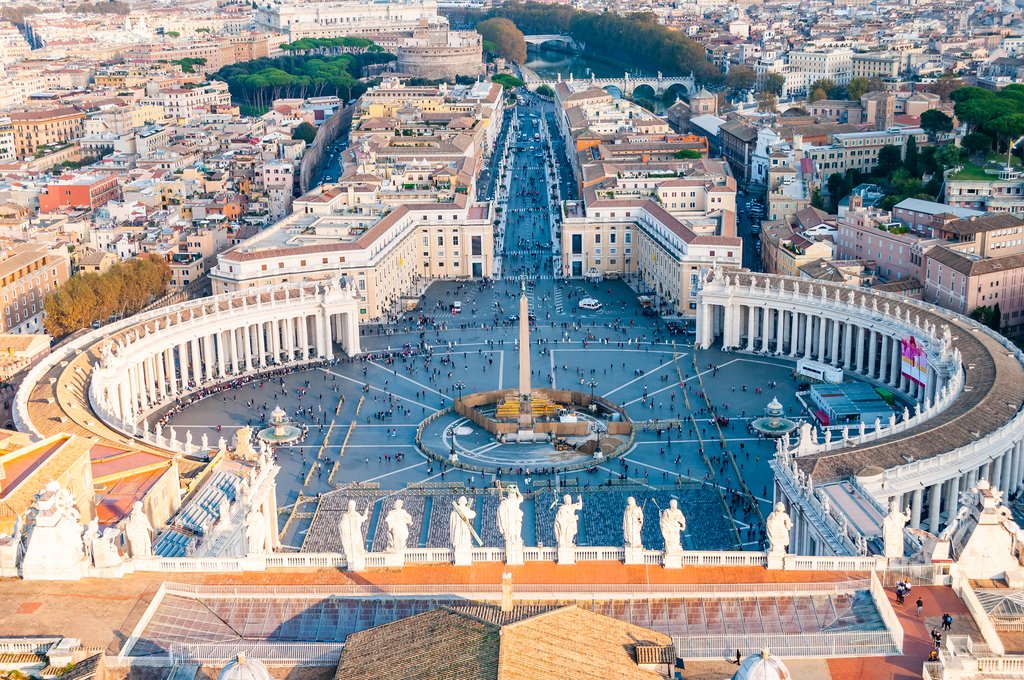
Today you'll visit the Vatican City museums and Sistine Chapel, as well as other top sights, for an exclusive six-hour tour of the city's incredible art and history. Start at the Vatican, where you'll visit the Pio Clementio Museum, Gallery of the Candelabra, Gallery of Tapestries, and Gallery of the Geographical Maps. Continue to see the magnificent Raphael Rooms, ending in the breathtaking Sistine Chapel and St. Peter's Basilica. Experience the magic of Renaissance art as you learn about the secret details and untold stories of the masterpieces.
Afterward, continue into a city for a tour of the city's most notable landmarks. Cross Piazza della Repubblica to see the Fountain of the Nyands, then continue to see the Trevi Fountain, La Colonna di Marco Aurelio, and the Palazzo di Montecitorio, which Bernini designed. Admire the exterior of the Pantheon and head inside for a look at the ancient Roman temple, then head to Palazzo Madama—the Senate seat—ending at Piazza Navona.
End your evening with a stroll to the neighborhood piazza for gelato and some people-watching.
Day 13: Galleria Borghese, Free Afternoon in Rome

Today is a free day to explore the city. Head to Galleria Borghese, one of the world's premier art museums, for a self-guided visit to see works by extraordinary artists Bernini, Caravaggio, Canova, and Rafaello. The gallery's highlights include sculptures and paintings from Cardinal Scipione Borghese's collection (1579-1633). Admire Caravaggio's most important paintings, including "Boy with Basket of Fruit," and see Bernini and Canova's sculpture collection, boasting works such as "Apollo and Daphne" and "David." Rafaello's "Entombment of Christ" is also a must-see.
Walk through the ornate rooms and explore the splendid frescoes, stories, and masterful techniques behind the masterpieces. End the tour with a peaceful stroll around the Villa Borghese gardens, enjoying its beauty and calm, far from the chaos of the city. Please note that although this is a self-guided tour, a guided option is also available.
Other suggested activities include:
- Visit the Museo Nazionale di Castel Sant'Angelo history museum
- Tour the Renaissance Villa Farnesina in the Trastevere district
- Go for a stroll in the buzzing Monti neighborhood, an eclectic area in the city center full of hip wine bars and trendy boutiques
- Head out of the city for a day at the Ostia beach for miles of sand and warm sea
- Visit the historic and fascinating neighborhood of Testaccio to see the giant Monte Testaccio, an ancient pile of discarded olive oil jars from the second century CE
- Spend an afternoon at the Musei Capitolini, the oldest and one of the best museums in Italy
In the evening, head back to the Trastevere neighborhood for dinner at an osteria or a trattoria, followed by drinks at a trendy wine bar.
Day 14: Depart Rome

Time to say goodbye to the country of love! After one last cappuccino over breakfast, head to the airport for your connecting flight home. Safe travels!
More Great Italy Itineraries
Looking for more inspiration for your trip to Italy? Check out these other Italy itineraries, explore different ways to spend two weeks in Italy, or discover the best time to visit Italy.



